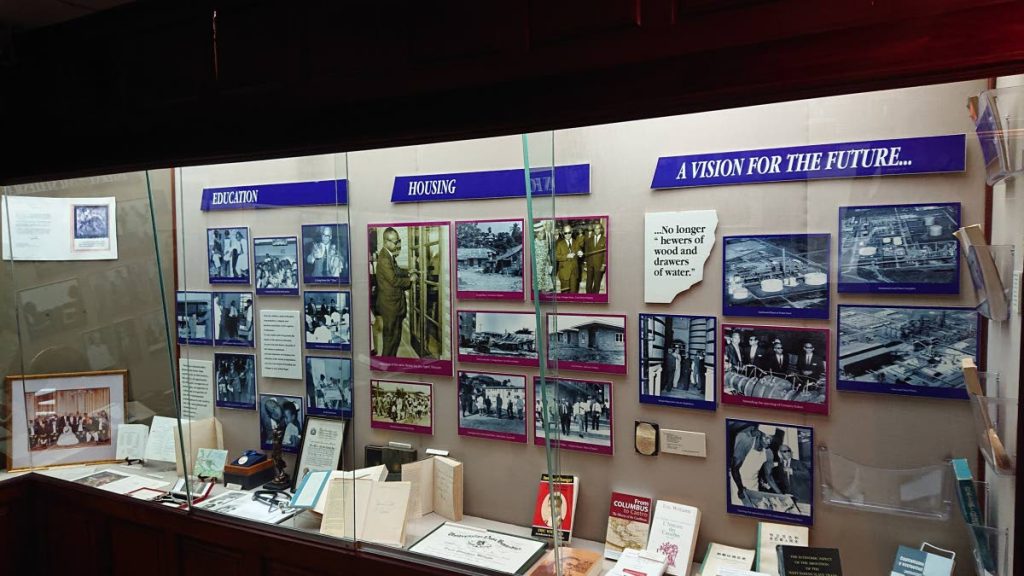Slave trade damage needs repair

HAS much changed with globalisation? How far has this country and the Caribbean come from being ruled by the colonial powers? These and other questions surrounding a contemporary Caribbean in a wider world were examined last week by scholars and lecturers at the University of the West Indies’ symposium “Capitalism and Slavery – 75 years later.”
The two-day conference which took place on November 13 and 14, considered the ideas put forward by Dr Eric Williams in his book, Capitalism and Slavery, published in 1944, and the impact they have made.
The book looked at the relationship between early capitalism and the slave trade during the 17th and 18th centuries. Williams’ thesis held that capitalism as an economic process quickly replaced slavery once European elites accumulated the vast surplus capital from the slave trade that they needed in order to support their industrial revolution. The symposium also analysed Williams’ thinking at the time, through his work and leadership as first prime minister of TT.
Held at the UWI School of Education, collaborating partners included the UWI Centre for Reparation and Research, the Faculty of Humanities and Education, and the Caricom Reparations Commission.
Among the topics was “Williams the man,” that included contributions from his daughter Erica Williams-Connell; Minister in the Ministry of Education Dr Lovell Francis, and a founding member of the People’s National Movement (PNM) Ferdinand "Ferdie" Ferreira. Other panellists shared their views on Williams’ wit, honesty, charisma, leadership, political strength and downfalls.
Williams-Connell presentation centred on her father’s contribution to the country and the wider Caribbean from her perspective as a child and as founder and curator of his archive – the Eric Williams Memorial Collection.
She said her father was like any other person but was meant for greatness.
“He could be difficult, arrogant with his political foes and made mistakes at times, but Williams was a man that was too big to be small.”
Williams-Connell said his vision for development was immeasurable, and upon taking office, it began to materialise.
“His first goal upon taking up office was to educate. With his watchword,s ‘to educate is to emancipate’ the literacy rate increased, provisions in social welfare improved, among other things.”
She noted that his work in the oil and gas sector ensured that the country benefited from its abundance and allowed for the establishment of downstream industries.
“These eventually allowed TT to become the world’s second producer of ammonia and the leading producer of natural gas to the United States.”
While there were mistakes, his daughter concluded that Williams was a dedicated democrat and stood for inclusion. If he were around today, the current political climate would be a disappointment, she added.
Francis looked at Williams’ contribution in the sugar industry of 1962 to 1980. Williams' strong-handling of this sector, he said, allowed for a successful industry until the ultimate demise of Caroni 1975 Limited in 2003. His intervention in 1963 with the British government and the British owner at the time was bold and daring.
Francis said, “Williams took control of the situation and commanded the economy at the time. However, the wider economic climate made it challenging to navigate successfully.”
His efforts afforded him 75 acres of land with the purchase of Caroni, which is now the Point Lisas Industrial Estate. To some extent the energy industry is another part of his legacy, he said.
Francis added that Williams’ decisions may have turned some heads, but he was willing to take risks.
“I could question the choices he made. But if I understand as he understood, there were people, communities, institutions and a nation that were affected. It might not be the best economic decision, but it was a human decision. You can't justify what really was the right choice. It is never an easy thing.
“I see his intervention in sugar as not a historian or a politician but someone struggling to do the best that he could.”
Adding to the discussion, Ferreira said being able to work with Williams was an experience like none other. He said TT has much to celebrate given the setting on which it gained independence and republican status.
"These historic achievements must be taken against the backdrop of the historical calamities that occurred in most of the former colonies in adopting their freedom,” Ferreira said. "During a time of racial conflicts, inter-political party rivalry, successions, brutality and violence, Williams’ achievements had put TT on the world map."
While Williams made some mistakes, Ferreira said, his immense sacrifice laid the foundation for our democratic nation today. He noted that Williams’ contribution to development has protected TT from discrepancies faced by other Caribbean islands.
Ferreira added the Williams’ incomplete objectives are now left for the people to complete.
Capitalism and Slavery, the book, paved the way for discussions on Caribbean integration, the hidden profits from the enslavement system and reparations in the post-colonial Caribbean.


Comments
"Slave trade damage needs repair"